Everyone who knows even a little about SEO knows that it is vitally important to put your keywords in your title tag. Or is it? A recent statement by John Mueller made many question whether this is still true. Barry Schwartz wrote an article titled, “Google: Title tags are not a critical ranking signal” in which he quotes John Mueller in saying, “We do use [the title tag] for ranking, but it's not the most critical part of a page. So it's not worthwhile filling it with keywords to kind of hope that it works that way.”
This lead many to wonder whether the common practice of ensuring that you have your main keyword at, or near the beginning of your title tag was still important.
So, I decided to do a little experiment.
(Note: Things are actually still changing in the SERPS after I published this post. Click here to jump to the update.)
First, I created 3 completely made up words for which there were no Google results:
glurglewart:
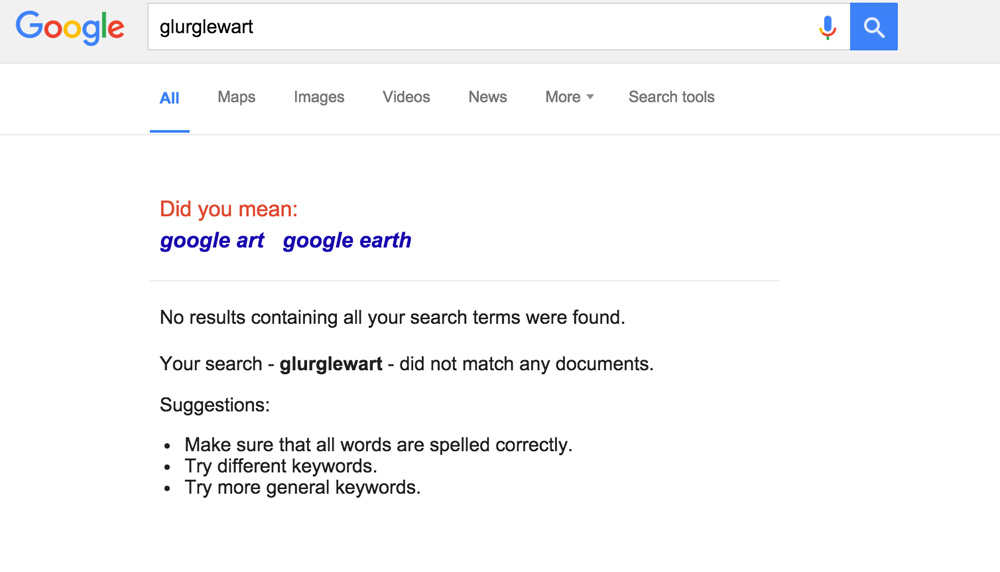
snirklewagger (haha…”did you mean snorklewacker?”)
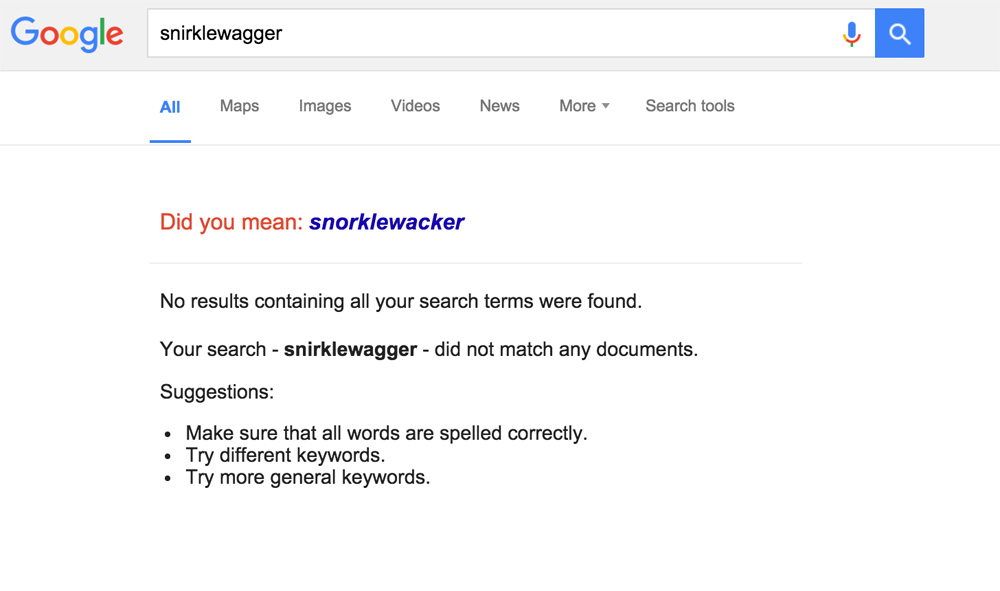
blabbynuffy
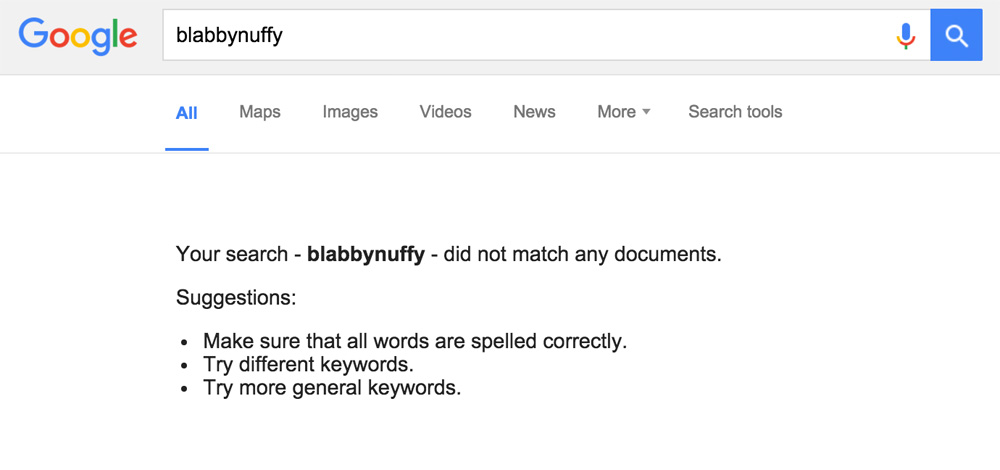
For each keyword I wrote 4 articles. For each article I used the keyword as the H1 tag and then once in the first line of content. I then wrote some content that is not likely to win me any pulitzer prizes. I could have used spun or autogenerated content, but I wanted to make sure it looked like it was legitimate English:
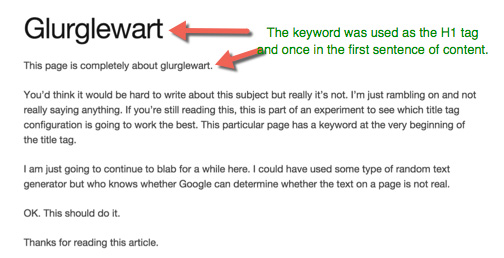
Then, for each of my 4 articles, I used one of the following title tags:
- Keyword is the first word.
- Keyword is in the middle of the title tag.
- Keyword is at the end of the title tag.
- No keyword in the title tag
I created these in a different order for each keyword just in case Google decided that with all else being equal they would rank them according to the order in which they were published.
Submitting to Google
I did not link to these articles. Instead, I used Fetch as Googlebot in Google Search Console to fetch each page so that Google could know that they exist.

I then submitted each of these to the index.

Initial results
I was amazed that within a couple of hours (possibly even earlier as I didn’t check right away), all of these pages were in Google’s index. Here is how Google initially presented the pages for glurglewart:
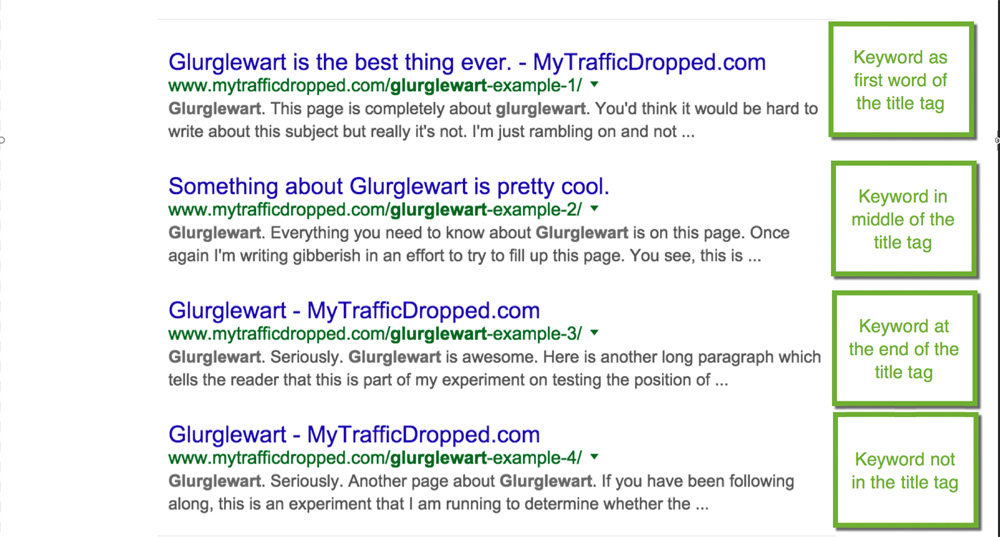
It’s interesting to see that Google rewrote my title tags. I did not have “- MyTrafficDropped.com” in any of the title tags. Also, the title tag for #3 was:
A really long title that tells you a whole bunch that you need to know about Glurglewart
and for #4 was:
Holy Moly. There is nothing in this title to tell me what the page is about
Still, the initial results were as expected. Google listed the result with the keyword at the front of the title tag first, the keyword in the middle second, the keyword at the end third, and no keyword last.
It is important to note that these are not necessarily how Google ranked the results as often pages will get indexed quickly and then ranking follows a week or several weeks later. I had intended to follow these for several weeks, but if you’ll read on, you’ll see that Google foiled my experiment.
Now, let’s look at our second set of pages:
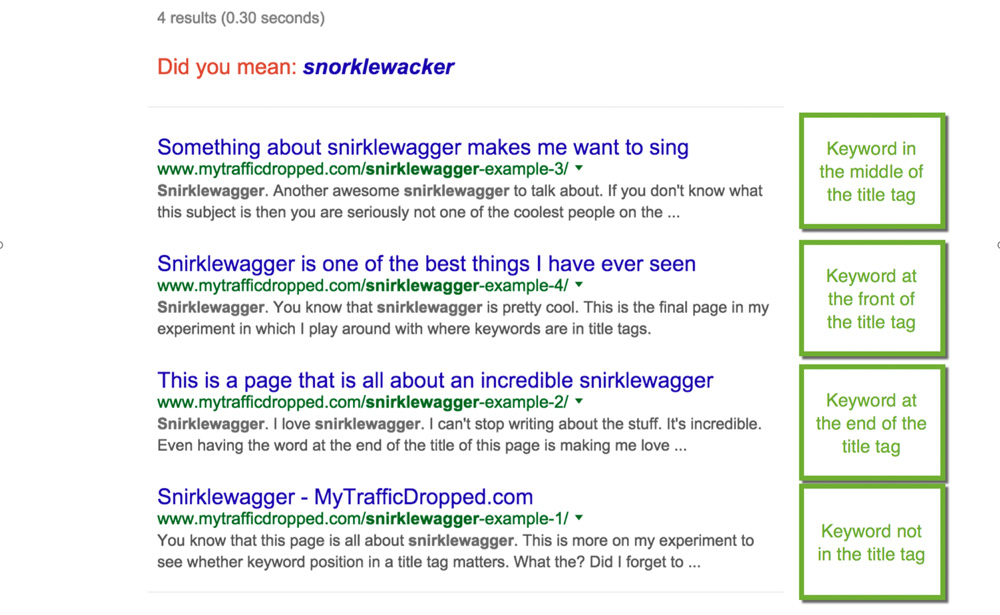
Once again, Google rewrote one of my title tags. It’s interesting that this time, the position with the keyword at the front and the keyword in the middle were reversed. But, as expected, the results with the keyword at the end, or no keyword at all, did not get listed as highly.
And for our final set of articles:
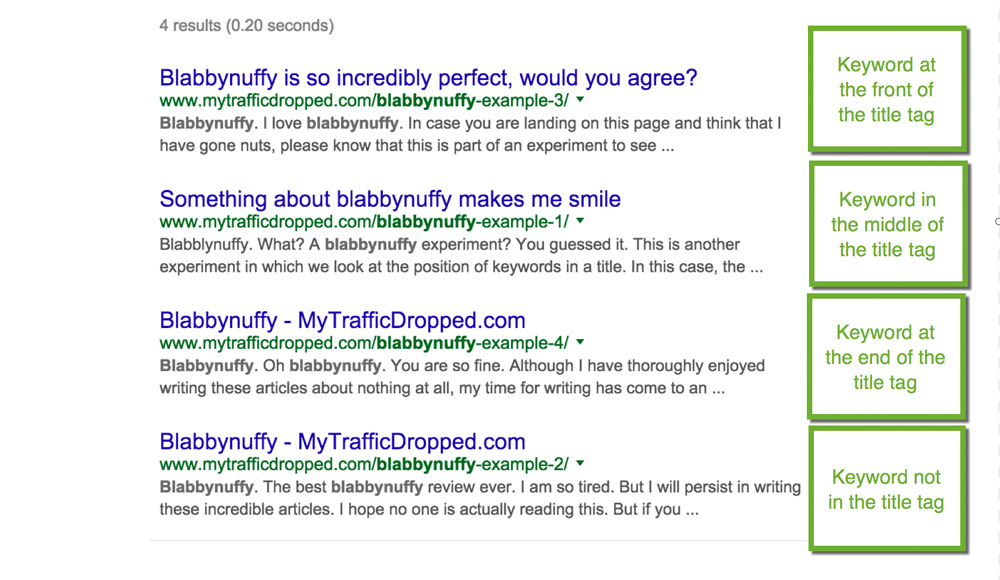
These were once again in the order which I expected. Once again Google rewrote some title tags. The title tag for the result listed at #3 was:
A long long description of everything that one should know about blabbynuffy
And #4 was:
You would not believe what happens after you read this article.
What I intended to do next
My plan was to continue to watch these rankings for 1-2 weeks to see if eventually Google changed them. I had anticipated that for the second set of queries that Google would eventually list the result with the keyword at the start of the title first. If that didn't happen, then I was planning to create several new sets of articles to see if I could replicate these results.
The next step that I was going to take was to take the articles that had no keyword in the title (and were ranking #4) and see if I could push those up higher by adding more keywords in the text, writing longer and more polished text, and also adding some images and possibly video. The goal here was to see if I could make it so that the content in the article trumped the title.
But, here is what happened when I went to check my positions today:
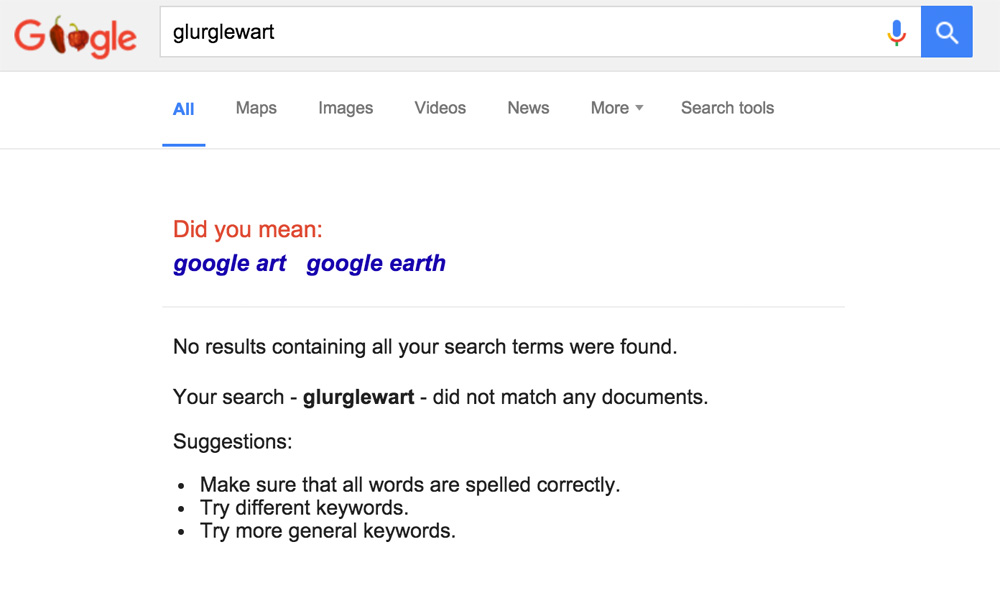
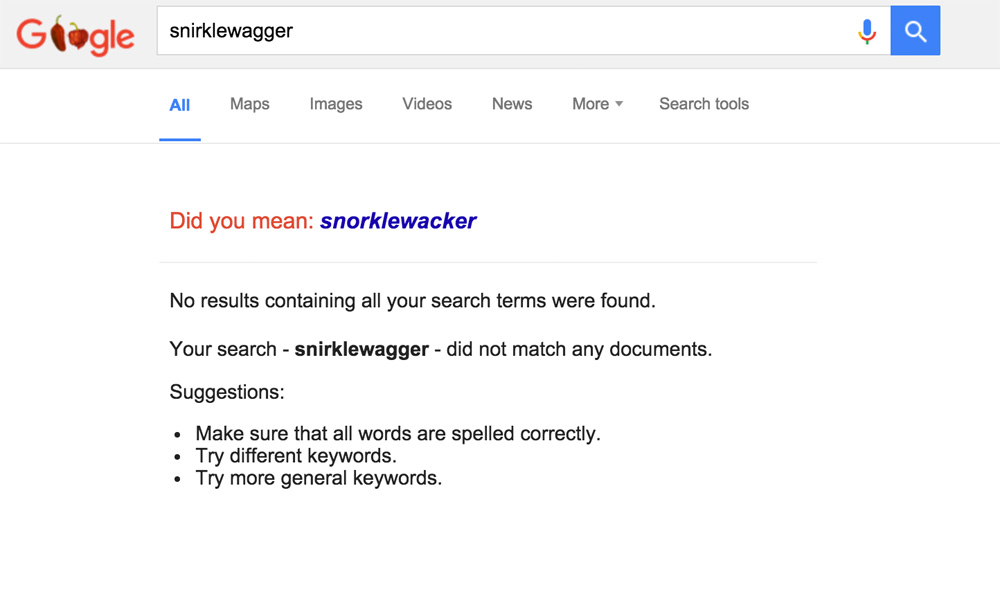
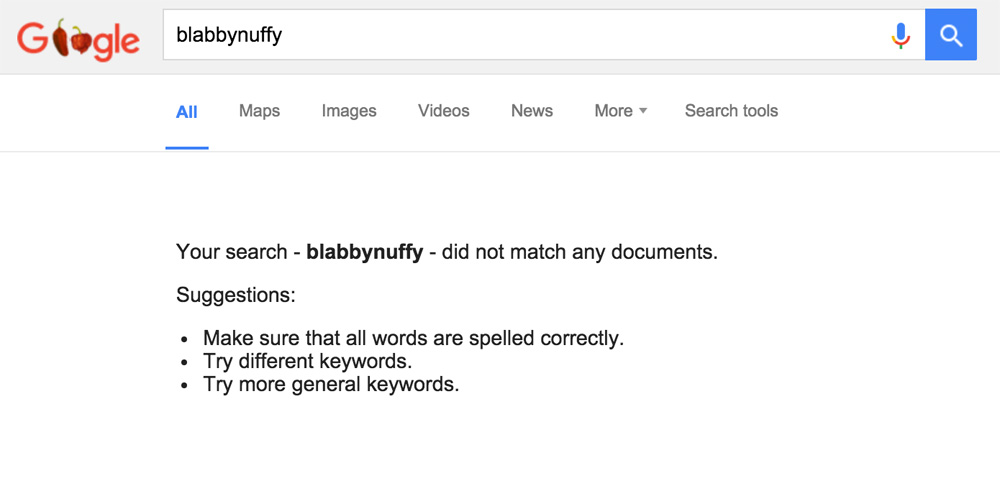
Dammit Google! >:-(
(Update at 3:45 pm EST January 22: Some of these posts are now appearing in the index again. Glenn Gabe just sent me a screenshot of the mytrafficdropped.com page for glurglewart appearing in the SERPS. I can also see one for snirklewagger. I may have published too soon! I will document what is happening and update the post in a few days.)
What just happened here?
It looks to me like initially my request to submit these pages to the index did just that - got them indexed. But then, today, three days after they were submitted, Google started to figure out how to rank these pages. I suspect that the algorithms were able to determine that the pages were junk and not helpful to anyone who was searching on Google. Somehow the algorithm made a decision to remove these from the index.
I can’t find them at all on a site: search or even if I search for text from these articles in quotes.
Conclusions
It’s hard to draw concrete conclusions from this experiment. As with most SEO experiments there are a lot of variables. John Mueller did not say that the title tag had no bearing on rankings anymore. But, rather, he was implying that the content on the page is more important than whether or not you can get keywords in your title tag. Still, I do believe that it is still important to have your main keyword in your title tag and preferably at the start of the tag, provided that you can do this in a way that reads well for users and is not keyword stuffing.
I would love to hear your thoughts. Here are some questions that I have:
- Why do you think that Google rewrote my title tags?
- Why do you think that these pages got indexed and then deindexed?
- Can you think of a way that I can repeat this experiment and make it better?



Comments
1) Why do you think that Google rewrote my title tags?
https://support.google.com/webmasters/answer/35624?hl=en
If we’ve detected that a particular result has one of the above issues with its title, we may try to generate an improved title from anchors, on-page text, or other sources. However, sometimes even pages with well-formulated, concise, descriptive titles will end up with different titles in our search results to better indicate their relevance to the query.
Thanks. I suppose that perhaps because I was searching just for that keyword, Google tried to rewrite the titles to make them more appropriate to my keyword. But why add the site url at the end? How does that improve the results?
I don’t know but I’ve seen this before – website name or brand (organization) name were added in the title.
For position three, you have used more than 70 chars in title. But google shows 70-71 chars(including space). So google omitted your title and used the searched “word” and added web address to the end.
For position four, Although you have not used title, Google have found the searched “word” in the sub-directory. So google used the searched “word” and added the website address to the end. The web address may be for the purpose of filling up 70 chars.
Barry’s title was very misleading. As you point out JM did not say the title doesn’t matter, he just said it doesn’t matter as much as the content — which, duh. Obviously you can’t rank just by putting up empty pages with great title tags.
Elisa Is definitely correct but. You definitely could still stay in Google’s index based on domain authority.
I say try this experiment with WordPress is the sample welcome page and be certain to geo-target the domain to the United States
If this was done on Fortune 500 domain it would be indexed and stay there. I have proof.
Looks like the pages were demoted to the supplemental indices:
https://www.google.com/search?num=100&hl=en&gbv=2&q=info%3Awww.mytrafficdropped.com%2Fglurglewart-example-1%2F
Still, taking them out of the primary indices makes it pretty much impossible for experimentation. I’ve just become aware of the “info:” operator so I’ve been having some fun with it. This was a good use for it!
Interesting! It’s odd that I didn’t get the “repeat this search with omitted results included”.
Great initial experiment Marie. Here’s my insights to your queries:
Why do you think that Google rewrote my title tags?
-This is currently happening to some of the sites I work on as well. The only thing that I can hypothesize is that potentially Google will rewrite the title tag if it’s a very niche search term that gets optimized for quite frequently. It may send some sort of spam signal and rewrite based on page content.
Why do you think that these pages got indexed and then deindexed?
-This may be a really “too soon?” hypothesis, but now that Panada is part of the core algo, it may work much faster to recognize thin, useless content.
Can you think of a way that I can repeat this experiment and make it better?
-I would try the exact same approach next experiment, but try publishing from separate TLD’s (if you have four you can experiment with) and potentially a day apart from each other. If it’s a very early stage of a trending term, Google may be more opt to keeping it.
Thanks Chad. If you are right and the core algo is able to determine that this is useless content I would love to know why. That is fascinating. I purposely did not use auto-generated junk for the text so that it would be seen as decent content.
Hmmm…..I could possibly do this experiment on different TLDs. I’d have to use ones that are not developed as Google could use the different authority of each domain to determine where they rank. I’ll definitely be doing more experiments in this vein so thanks for that idea.
I would suspect that no matter how “quality” content is, publishing four identical copies, at the same time, is a signal of poor quality content. What user would want to see four copies of the same thing? I.E duplicate content. With multiple tlds, make sure they are previously unused, or have the same links so it’s a level playing field. I like your next step for the experiment… I look forward to seeing what you can do with improving the content on one article to trump the others. Will that article get re-indexed? Will all of them get rendered?
Good thoughts. While the H1 tag was the same for each of the 4 articles, the text was unique for each of them. Still, if Google perceived them as duplicates of each other then I’d assume that they would choose one as the canonical and only show that one in the SERPS. It intrigues me to know why they all were deindexed.
I like the idea of using multiple TLD’s. A plan is forming already for my next experiment. 🙂
And if you really want to get multi variant, throw a subdomain in there as well :). Let’s get crazy!
Love it, Marie! Nice to see a bit of SEO humour 🙂
So what happens if you do link to the pages? That might be an interesting twist on the experiment.
Or perhaps including your made up word in a page or post that is already indexed?
Curious if Google consolidated some of the pages in the index because they were too similar and that’s why you saw some drop out or if there was a quality filter run against the pages.
I’d also be curious to see the impact of the same experiment but using a canonical from 3 pages to one with the least optimized title tag to see if Google keeps only that page in the index or takes the optimized title tag for that page.
When you talked about preparing them in a fashion because indexed first, it made me think about what Google has done to incentivize HTTPS offering to index all encrypted pages first. ( A very tall order if you ask me considering domain authority etc.)
These pages contain no text? It was a strain on your crawl budget and why not purchase five new domains same length but using something like 6A773WW dot US up of the same TLD .us. Therefore, there’s no variable on where you’re targeting. I think that way you can comprise them of something very generic like the WordPress intro page, i.e., http://dev-bptestsite.pantheon.io/ (The URL is non-indexable without a domain just letting you know.)
I’m happy to supply the hosting on the same data center on the same container-based system or VPS.
Tom
Google rewrote your title tags because they had no idea what the best thing for the end-user would just base on the type of keywords you used or entirely unsuitable dummy based content provided.
What occurred when queried thought the page was possibly better for the end-user because of Google’s deep learning, an algorithm that’s great at the understanding of the English language.
Was trying to make heads or tails of your content and title tag.
That’s why I say if you want to do this without anything that could be very similar to a real word in another language by using .us or geo-targeting
Let’s make sure we’re not confusing Google with words that sound like other words.
The reason they appeared In Google’s index based on the domain authority and the fact that you had fetched them as a Googlebot.
Google regularly takes its time, to figure out what is the best thing to do with a particular landing page.
I believe you were the deindexed once Google either thought it was a bunch of nonsense or spam.
You are not getting enough of the on page signals Google uses when people do search that keyword and try to find a site.
Why did they come back from the dead? Because you were querying that term and selecting your site thus, Google was attempting to learn what it meant.
I am sure that if you had enough people searching Google asking these terms and staying on the site with Google Analytics (just to be safe) on your test page, it would be different.
Call me crazy but I think that title tags are losing their juice is a ranking signal alone. Yes they matter because technically the better written title tag is going to be clicked on more often combine that with less pogo sticking and you get better ranking based on how people are behaving when they are on your site.
I agree with what John has said and I have a lot of evidence to prove it that I would prefer not be public. Though I am happy to share with you If you will keep it private.
Please excuse my poor writing and let me know if you would like to see what I’m talking about.
Tom
Really awesome experiment waiting for new updated on it.
I’ve seen the re-writing of tags before, quite often with Google taking info from other sources. DMOZ is usually a main source of amended or adjusted meta.
Interesting experiment though, thanks!
I’ve seen that too, but trust me, these pages are not in the dmoz index. 🙂
Just to let you know, I am seeing four results in Google for glurglewart – three from mytrafficdropped.com, and the fourth result is this post on mariehaynes.com.
I’m using google.ca (Canada).
Yep. They’re back! I’m going to let the results sit for a few days and then update the post.
I can only second Ian Scott. It appears to be true for all three keywords, appearing in the same order you showed except that the pages without keywords in title don’t appear at all.
I’ve just searched for snirklewagger and I get a full page of results.
http://s8.postimg.org/j6764gjnp/Screenshot_2016_03_04_15_05_19.png
Very interesting experiment, thanks for sharing.
Ben
http://www.thecontentworks.uk
thanks for this wonderful site, i really like all about this contents
this is great site that everyone will like
thanks for this wonderful information about SEO. it is great stuff. I apply this information to my blog. thanks a lot.